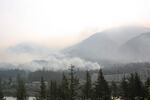
The Eagle Creek Fire as seen across the Columbia River in Stevenson, Washington, Sept. 8, 2017.
Conrad Wilson / OPB
UPDATE (Sunday 5 p.m. PST): The man-made Eagle Creek Fire has brought the Columbia River Gorge to a standstill since it ignited Saturday, Sept. 2, 2017. That's not expected to change anytime soon.
The Oregon Department of Transportation announced Sunday evening Interstate 84 through the Gorge, closed since Monday, Sept. 4, will remain closed for at least another week — "the minimum time required to complete rock removal," the agency said in a press release. The Historic Columbia River Highway also remains closed, with no current schedule to reopen.
Hundreds of residents remain evacuated from their homes due to the fire and ongoing efforts to contain it.
But crews battling the Eagle Creek Fire did receive some gifts this weekend in the form of drizzly rain, lower temperatures, and light winds.
The National Weather Service in Portland said the Columbia River Gorge received light rainfall early Saturday and was hit with additional prolonged drizzle for roughly 12 hours Saturday evening into Sunday morning. That light, steady rain was just what the region needed to moisten up, said NWS meteorologist Colby Neuman. He said that kind of precipitation helps moisten up the fuels that feed wildfires — dry grasses, twigs, branches — and is preferable to a heavy rainstorm.
"We have a little bit more room to breathe," he said of the rain.
Low winds and high humidity helped limit the spread of the Eagle Creek Fire — which now stands at more than 33,000 acres — over the weekend. The fire remains 7 percent contained as of Sunday.
Related: Eagle Creek Fire Brings Together Local, State, Federal Leaders
Fire activity is expected to pick back up as conditions in the Gorge dry out and warm up to begin the week, with sustained eastward winds up in the ridges of the Gorge of about 10-15 mph and highs in the upper 70s to low 80s for much of the Gorge through Tuesday, according to the NWS.
But as Neuman noted, that's a far cry from the 20-25 mph sustained winds and 40-45 mph gusts that occurred last week when the fire exploded in growth from a few thousand acres to more than 30,000 in a matter of days.
Fire crews used the slowed growth as an opportunity to work on containment lines, officials said Sunday. More than 300 structural firefighters are working throughout the Gorge to keep people's homes and businesses safe from the fires. Fire officials said they expect the fire to pick back up Monday and test their efforts.
The Multnomah County Sheriff's Office ensured homes on the western edge of the fire's evacuation zone are under constant watch by law enforcement officers to prevent any attempts of looting.
Smoke from the wildfire continues to remain a health issue for residents in the Columbia River Gorge. The Oregon Department of Environmental Quality has continued an air quality alert for the central Gorge and the Hood River Valley until 10 a.m. Monday.
Police say a 15-year-old boy from Vancouver, Washington, is a suspect in the case. They believe he and others may have started the fire by playing with fireworks near the Eagle Creek trailhead. In Washington, the Archer Mountain Fire, likely started by embers from the Oregon wildfires, was burning more than 200 acres Friday, as reported by The Columbian.
The Eagle Creek Fire is the nation's top firefighting priority, having taken that title from southern Oregon's 182,000-plus acre Chetco Bar Fire on Thursday.
On Friday, Oregon Republican Rep. Greg Walden introduced legislation aimed at expediting salvage and reforestation efforts in the Columbia River Gorge.
"What we’re trying to do here is clear the bureaucratic decks so that the professionals can do their job and do it quicker," Walden said of his bill at a press conference Saturday.

